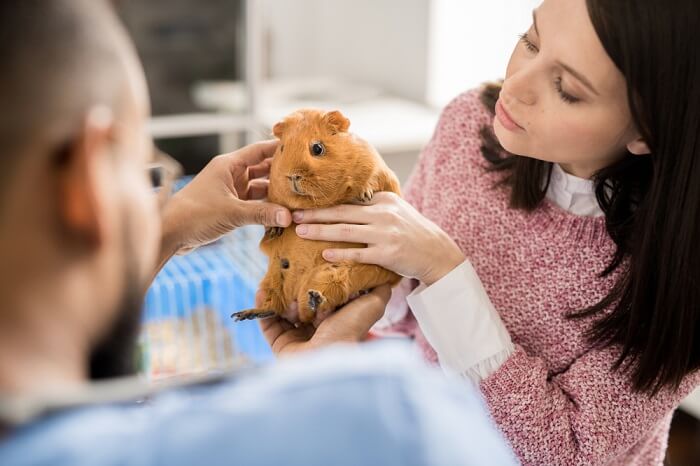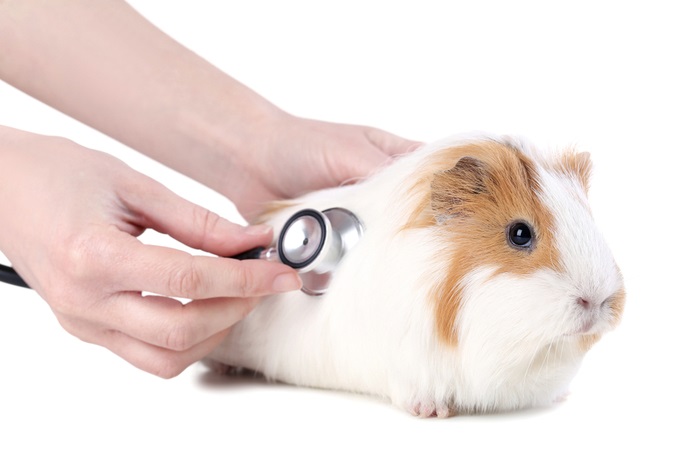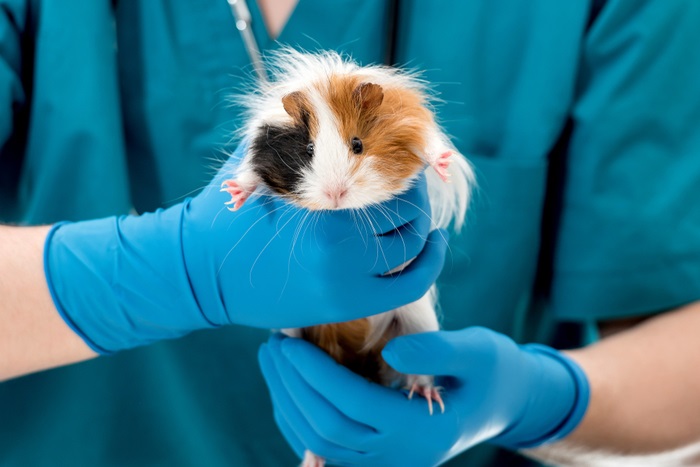11 Signs A Guinea Pig Is Sick Or Dying?
This page contains affiliate links. We may earn money or products from the companies mentioned in this post through our independently chosen links, which earn us a commission. Learn More
Animals can’t tell you when they’re feeling sick and, even if they could, they probably wouldn’t. It’s a natural instinct for animals to hide their illness so they don’t show weakness around predators.
Unfortunately, that means pet owners often miss the signs before it’s too late.
Guinea pig owners should take the time to learn about the most common health problems that affect guinea pigs so they can see the signs. It’s best to treat health problems in the early stages because once a guinea pig gets sick, they tend to go downhill fast.
Read on to learn about common and life-threatening health issues guinea pig owners should know about and how to identify the signs that your piggy is sick or dying.
Common Signs Of Illness In Guinea Pigs

Guinea pigs make wonderful pets for many reasons. Near the top of the list, however, is the fact that they are fairly low-maintenance pets and generally not expensive to keep.
That being said, you need to be a responsible pet owner and provide for your guinea pig’s needs to keep him healthy. Part of that responsibility includes learning to recognize the common signs of illness in your small pet.
Here are some common signs of illness in guinea pigs:
- Loss of appetite
- Patches of hair loss
- Changes in coat condition
- Weight loss
- Changes in urinating and defecating
- Respiratory problems
- Eye/nose discharge
- Lack of coordination, limping
- Hunched posture
- Lethargy, lack of energy
- Changes in behavior
If your guinea pig is showing signs of illness, it’s important to see a veterinarian sooner rather than later. Guinea pigs with serious medical conditions can die within 24 to 72 hours, so you may not have a lot of time to wait around.
Unfortunately, even if you do seek treatment there may be nothing you can do.
The Top 9 Health Issues In Guinea Pigs

Because treating health issues in guinea pigs can be difficult, it’s important for pet owners to know the basics about common health problems so they can see the signs early. Staying up-to-date on your pet’s health is an essential aspect of guinea pig care.
Here are some of the most common health problems in guinea pigs:
- Dental issues. A guinea pig’s teeth grow constantly, so they need roughage (fresh hay) in their diet to wear down their teeth. Without it, they could develop issues like drooling, weight loss, and trouble eating.
- Scurvy. Caused by a vitamin C deficiency, scurvy is fairly common in guinea pigs because they cannot make their own vitamin C like other animals. Guinea pigs need a diet rich in leafy green veggies and other natural sources of vitamin C.
- Diarrhea. Guinea pigs have very sensitive digestive tracts, so changes to their diet can lead to issues like diarrhea. If your guinea pig develops diarrhea, seek medical attention immediately.
- Ringworm. Caused by a fungus, ringworm is a fairly common problem. Bald patches, often with a red, flaky ring around them, are the most common signs.
- Respiratory problems. Guinea pigs are susceptible to respiratory infections such as Bordetella and Streptococcus, especially with dusty bedding and poor hygiene. Signs of respiratory illness in guinea pigs include sneezing, wheezing, and rapid, shallow, or raspy breathing.
- Parasite infestations. External parasites like fleas and mites can cause itchiness, hair loss, and other issues in guinea pigs. Fortunately, these issues are fairly easy to treat.
- Urinary tract issues. Bladder stones, inflammation, and urinary tract infections are fairly common in guinea pigs and are usually related to poor diet and hygiene. It may also be caused by a diet too high in calcium.
- Ovarian diseases. Female guinea pigs can develop uterine and ovarian diseases including various forms of cancer. Spaying female guinea pigs is the best prevention.
- Abscesses. Guinea pigs form very thick pus, so it doesn’t drain easily – this can lead to abscesses. They can occur on the skin, muscles, teeth, bones, and even internal organs.
These issues can affect all pet guinea pigs – there may not be a significant difference among different guinea pig breeds. All pet guinea pigs come from the same species, after all.
Though there may not be significant differences among different breeds, each guinea pig is unique so it’s a good idea to spend plenty of time with your cavy to get used to your guinea pig’s behavior. A change in behavior is often the first noticeable sign of illness in a small animal.
What To Do With A Sick Guinea Pig?

By the time you notice your guinea pig is sick, you may not have a lot of time to get treatment. This could be complicated by the fact that many veterinarians don’t treat small animals like guinea pigs.
When you bring a new guinea pig home, it’s a good idea to find a vet in your area that treats guinea pigs and take your new pet in for an initial checkup to establish care. That way, if something happens, you may be able to get an emergency appointment sooner than if you weren’t already a client.
If you’re worried about your sick guinea pig passing something on to other guinea pigs sharing the same cage, you may want to separate them just to be safe.
If you don’t have a spare guinea pig cage or hutch, a guinea pig playpen could be a good alternative. Just make sure your cavy has everything he needs – a comfy place to rest, a fresh water bottle, food, and hay.
Even if your guinea pig seems healthy, it’s your responsibility as a pet owner to keep up with annual checkups. Your veterinarian will help you keep tabs on your guinea pig’s health and spot any developing issues while they are still treatable.
Frequently Asked Questions
How long do guinea pigs live?
The average lifespan for a guinea pig is about 4 to 8 years. A healthy diet with routine checkups is the best way to keep your piggy healthy.
Do guinea pigs need supplements?
The only supplement your guinea pig is likely to need is vitamin C, but even that can be provided through leafy green vegetable and small amounts of certain fruits. Calcium is another essential nutrient, but you want to avoid giving your guinea pig too much, so supplements are not recommended.
Where can I get a guinea pig?
You can easily find a guinea pig at the pet store, but before you shop consider checking your local shelter or rescue. Guinea pigs are often found at shelters and they may even come with a cage and other supplies.



